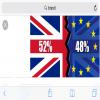| Calm Before The Storm? 10:48 - Jun 22 with 9323 views | Shaky |
Markets might look calm, but they are behaving abnormally
The pessimistic view is years of loose monetary policy have made investors complacent
By Gillian Tett
FT, 21 June 2018
Do markets look a little weird right now? That is a question many investors might be asking. In recent weeks geopolitical tensions have intensified, and the monetary policy cycle is turning in both the US and Europe.
Equity markets quivered on Monday, which was the day after China said it would retaliate against new US tariffs by imposing tariffs of its own, but the jitters were modest. Indeed, the MSCI world equity index is up 10 per cent up for the past 12 months – never mind that pesky trade war.
This is odd. But what is more striking – and alarming – is that equity valuations are far from the only bizarre feature of today’s markets. If you peer into the weeds of global finance, you will see peculiarities sprouting all over the place.
Consider credit. These days, pundits often wail about the rising risks attached to corporate debt. A survey from Bank of America Merrill Lynch shows that 42 per cent of asset managers now think that developed world companies have borrowed too much money– beating a previous 2008 peak of 32 per cent.
No surprise there, perhaps: corporate borrowing has indeed soared, amid numerous leveraged buyouts and mergers, and almost half of all US corporate bonds issued this year carry a risky rating of triple B-plus, triple B or triple B-minus. What is startling is that investors are not running scared. Instead, demand for risky debt is so high that the spread between safe and hazardous corporate debt (bonds rated triple A and triple B respectively) is a wafer-thin 50 basis points. In 2012 it was 200bp.
The second puzzle is the so-called dollar “term premium”– the US Federal Reserve’s calculation of the extra compensation investors require to convince them to tie up their money in longer term bonds rather than rolling over a series of short-term ones. Normally this would be positive in this stage of the business cycle. The Fed is raising rates, inflation is edging up and the US government will sell lots more debt in the coming years, due to tax cuts and rising budget deficits. But the US term premium has been zero in recent months. More peculiar still, JPMorgan calculated that the global yield curve has recently inverted for the first time since 2007.
A third oddity is the lack of correlation between currencies and interest rates differentials. Derivative prices currently suggest that investors expect to see a widening gap between US, European and Japanese interest rates. Citigroup calculates that the spread between projected overnight rates for dollars and euros is 250 basis points, up from 25 basis points in 2016 and 100 basis points last year.
In past economic cycles this gap has led to a stronger dollar. That has recently appeared – a bit. On a trade weighted basis, the dollar is 5 per cent stronger than in February, but it is also 4 per cent lower than it was at the start of the year. The correlations seem to have broken down, as Catherine Mann, Citi’s chief economist, points out.
The list goes on – and on. Ms Mann thinks it is odd that house prices keep surging in countries such as Denmark, the Netherlands and Canada, even as the monetary policy cycle turns; and that investors keep rushing into US equity markets, even though valuations should favour non-US assets. Then there is the fact that gold prices have fallen 5 per cent in the past two months – even though geopolitical turmoil normally boosts the price of gold. And the Vix index (which reflects expected US equity market volatility) has recently fallen below 15, after rising above 30 earlier this year. That looks completely counter-intuitive given the geopolitical risk – and the fact that some investors holding Vix derivatives suffered big losses a mere four months ago, when this index gyrated.
So what explains these odd features? One optimistic explanation might be that investors are so wildly confident about global growth that they presume companies will tackle their debt and produce earnings that justify the share prices. Under this theory consumers would continue paying down their mortgages, as inflation remained low (perhaps because digital disruption will suppress labour costs). But there is another pessimistic explanation: years of ultra-loose monetary policy have made investors so complacent that they are mis-pricing risk.
I fervently hope the first explanation is true. But I fear the second is a more likely bet. Either way, the key point is this: don’t assume that markets look “normal” today even if they are (mostly) calm, especially not in a geopolitical world that looks anything but peaceful, let alone normal.
|  |
| |  |
| Calm Before The Storm? on 10:28 - Sep 1 with 1821 views | Catullus |
| Calm Before The Storm? on 18:43 - Jun 23 by LeonWasGod |
If that's her real picture, the last thing I'd want to do with her is talk Fibiloconocci Renouncements. |
That's Jennifer Lawrence! Interest rates are high. |  |
|  |
| Calm Before The Storm? on 10:39 - Sep 1 with 1805 views | Shaky |
| Calm Before The Storm? on 23:05 - Aug 31 by Elmo |
From time of posting: DJ30 reached the 76.4% retracement at 28850...and beyond with a new Higher Low Hammer off the 76.4 today
A massive bullish move, as predicted
So much for the OP's unfounded pessimistic thread |
Erm. I posted a commentary by the FT's excellent Gillian Tett
My own remark was "Nope, looking more like a classic autumn panic."
And unless I am very much mistaken - which I am not - autumn doesn't start until later in September.
Get a fcuking life. |  |
|  |
| Calm Before The Storm? on 10:43 - Sep 1 with 1801 views | Shaky |
| Calm Before The Storm? on 23:05 - Aug 31 by Elmo |
From time of posting: DJ30 reached the 76.4% retracement at 28850...and beyond with a new Higher Low Hammer off the 76.4 today
A massive bullish move, as predicted
So much for the OP's unfounded pessimistic thread |
Oh and the other thing Elmo, is if you are trading the Dow you are an idiot. |  |
|  |
| Calm Before The Storm? on 10:47 - Sep 1 with 1793 views | pikeypaul |
You are a guesser and totally clueless.
So any one who trades the DOW is an idiot in your view.
Is that because you tried and lost?
So In your view some of the richest men in the world are idiots. |  |
|  |
| Calm Before The Storm? on 11:11 - Sep 1 with 1776 views | Shaky |
| Calm Before The Storm? on 10:47 - Sep 1 by pikeypaul |
You are a guesser and totally clueless.
So any one who trades the DOW is an idiot in your view.
Is that because you tried and lost?
So In your view some of the richest men in the world are idiots. |
No, it is because the Dow is a price weighted index rather than a market capitalisation weighted index, which is why it is very simple to manipulate via only a handful of high priced stocks.
Furthermore, because it is so narrow comprising only 30 stocks, indispensable sentiment indicators like advance/decline numbers are of no practical relevance.
That's why serious traders always trade the S&P 500 index, or the Nasdaq 100 in a pinch. |  |
|  |
| Calm Before The Storm? on 17:12 - Sep 1 with 1660 views | Elmo |
| Calm Before The Storm? on 11:11 - Sep 1 by Shaky |
No, it is because the Dow is a price weighted index rather than a market capitalisation weighted index, which is why it is very simple to manipulate via only a handful of high priced stocks.
Furthermore, because it is so narrow comprising only 30 stocks, indispensable sentiment indicators like advance/decline numbers are of no practical relevance.
That's why serious traders always trade the S&P 500 index, or the Nasdaq 100 in a pinch. |
You clearly have no clue.
Was about to give you a lesson 'til I saw your unduly defensive-aggressive response to my post and in general.
I'l leave it there |  | |  |
| Calm Before The Storm? on 07:48 - Sep 2 with 1605 views | pikeypaul |
| Calm Before The Storm? on 11:11 - Sep 1 by Shaky |
No, it is because the Dow is a price weighted index rather than a market capitalisation weighted index, which is why it is very simple to manipulate via only a handful of high priced stocks.
Furthermore, because it is so narrow comprising only 30 stocks, indispensable sentiment indicators like advance/decline numbers are of no practical relevance.
That's why serious traders always trade the S&P 500 index, or the Nasdaq 100 in a pinch. |
You obviously understand nothing about trading.
Another thick up his own arse remoaner.
Do yourself a favour and go and find another essay to copy and paste to bore anyone stupid enough to read them with.
208 AFLI |  |
|  |
| Calm Before The Storm? on 13:29 - Sep 3 with 1543 views | Ebo |
| Calm Before The Storm? on 07:48 - Sep 2 by pikeypaul |
You obviously understand nothing about trading.
Another thick up his own arse remoaner.
Do yourself a favour and go and find another essay to copy and paste to bore anyone stupid enough to read them with.
208 AFLI |
You understand the square root of feck all about anything, |  |
|  |
| |